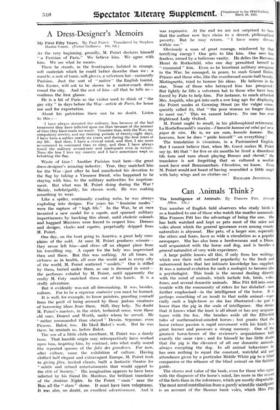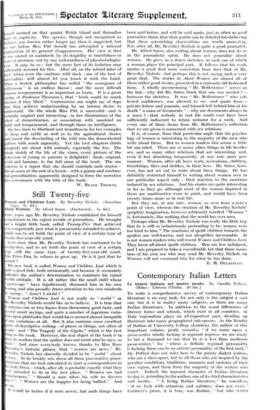Can Animals Think ?
THE number of English field observers who study birds as a hundred to one of those who watch the smaller mammals Miss -Frances Pitt has the advantage of being the one. She has both watched and kept as pets most of the mice and voles about which the general ignorance even among county naturalists is abysmal. Her pets, of a larger size, especially the otters and foxes, have as wide a circulation as a popular newspaper. She has also been a herclswoman and a Diana, well acquainted with the horse and dog, and is besides a general naturalist of very wide experience.
A large public knows all this, if only from her writings, which owe their well merited popularity to the fresh and unborrowed facts that her intimate knowledge has supplied. It was a natural evolution for such a zoologist to become als,! a psychologist. This book is the second dealing directl with the mind of animals, which include fish, birds, vole, foxes, and several domestic animals. Miss Pitt fell into smut, trouble with the community of riders for her disbelief—now further emphasised—in the intelligence of the horse. It is perhaps something of an insult to that noble animal—espe- cially such a high-brow as she has illustrated—to put it lower than the pig in the scale of intelligence. She denies that it knows what the hunt is all about or has any acquain- tance with the fox. She brushes aside all the Elberfeld tales of mathematical-minded horses ; but grants that the horse (whose passion is rapid movement with his kind) is a great learner and possesses a strong memory. One of the greatest horse-lovers of the reviewer's acquaintance held exactly the same view ; and for himself he has little doubt that the pig is the cleverest of all our domestic anima1.. always excepting the dog. In all animal behaviours In has seen nothing to equal the constant, watchful aid and attendance given by a particular Middle White pig to a blind companion or the reliance of the blind animal on the faithful guide. - The charm and value of the book, even for those who agree with the diagnosis of the horse's mind, lies more in the record of the facts than in the inferences, which are mostly disputable. The most novel contribution from a purelir scientific standpoint is an account of the Skomer bank voles, which Miss Pitt
erself secured on that quaint Welsh island and thereafter • ept in captivity. The species, though not recognized as stinct, was known rather longer ago than is suggested, but ) one before Miss Pitt herself has attempted a rational xplanation of its general disappearance. Her view is that t was ousted on mainlands by its stupidity or trustfulness or ant of alertness, not by any awkwardness of physicaladapta- ion. It may be so ; but the mere fact of its isolation may ufliciently account for this. After all, on the retired lakes of st Africa even the cautious wild duck—one of the best of urvivalists—will almost let you touch it with the hand. lat a Scotch philosopher has called "the emergence of nil-reason" is an endless theme ; and the more difficult ;manse temperament is as important as brain. It is a great • ying of Professor Thomson's, that birds could be much • leverer if they liked." Contrariwise one might say of dogs at they achieve understanding by an intense desire to mderstand. On the whole Miss Pitt is successful—and is ertainly original and interesting—in her illustrations of the
• ffeet of domestication, or association with mankind on whit and temperament, and through them on intelligence. She has been to Shetland and Scandinavia for her examples if sheep and cattle as well as to the agricultural shows; ad traced the dovetailing of the wild into the domesticated
• ttern with much ingenuity. Yet the best chapters (birds xeepted) are about wild animals, especially the fox. The
• hole sketch of the life of the vixen, every picture of the haviour of young or parents is delightful : fresh, original, ivid and humane, in the full sense of the word. The one riticism is a regret that she should conclude such stories— Ike an amen at the end of a hymn—with a jejune and mechan- ml generalization, apparently designed to force the narrative nto consonance with the title of the book.
W. BEACH TnomAs.















































 Previous page
Previous page